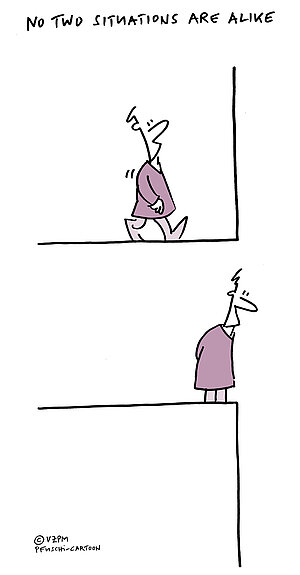Self-reflection and self-management
Definition
Self-reflection is the ability to acknowledge, reflect on and understand one’s own emotions, behaviours, preferences and values and to understand their impact.
Self-management is the ability to set personal goals, to check and adjust progress and to cope with daily work in a systematic way. It includes managing changing conditions and dealing successfully with stressful situations.
Purpose
The purpose of this competence element is to enable the individual to control and direct his or her behaviour by acknowledging the influence of his or her personal set of emotions, preferences and values. This enables effective and efficient use of the individual’s resources and leads to positive work energy and a balance
between inside and outside work.
Description
An intrinsic set of emotions, preferences and values guides all our decisions and actions. Being aware of and reflecting on this set and its impacts on behaviour offers you the opportunity to lead yourself. Reflecting on personal values and behaviour, seeking feedback and being aware of the individual natural primary reactions opens up the possibility of changing and improving behaviour. Being able to control primary reactions supports consistent behaviour, decisionmaking, communication and the leading of others. Adopting a systematic and disciplined approach to coping with daily work means managing how to spend time in order to accomplish prioritised objectives. Increasing the work efficiency does not mean working harder, but enables the individual to achieve results to a higher level of satisfaction and motivation. The individual works autonomously and independently from external influences, using opportunities to apply lessons learned.
Key competence indicators
Identify and reflect on the ways in which own values and experiences affect the work
To identify and reflect personal values and passions the individual has to acknowledge and reflect on his/her intrinsic set of opinions, standpoints, ideals and ethical values. This is the basis for consistent decisions and actions.
Personal experience has a strong influence on how the individual makes sense of situations and people. His or her personal experience of how the world works and how people behave influences the way the individual thinks and acts. By understanding the personal sense-making processes, the individual can identify why his or her interpretation might differ from someone else’s and so reduce the effect of bias. The opposite is to neglect the influence of experience and expect that everyone sees the ‘reality’ in the same way as the individual.
Measures
- Reflects on own values
- Uses own values and ideals to shape decisions
- Communicates own principles and personal demands
- Expresses and discusses own experience
- Puts own experience in perspective
- Uses own experience to build hypotheses about people and situations
Build self-confidence on the basis of personal strengths and weaknesses
Being self-aware includes reflection on personal strengths and weaknesses. The individual is aware of what he or she is good at and passionate about and which tasks should be delegated or left to others. Knowing his or her personal talents and accepting limitations creates a feeling of personal worth. The individual demonstrates self-confidence by relying on personal capacities and capabilities. The opposite is to remain troubled about yourself or your personality, continuing to doubt your talents and potential and overreacting if others impose on your personal weaknesses.
Measures
- Identifies own strengths, talents, limits and weaknesses
- Leverages strengths, talents and passions
- Identifies solutions to overcoming personal weaknesses and limitations
- Maintains eye contact even in stressful situations
- Accepts setbacks without losing confidence
Identify and reflect on personal motivations to set personal goals and keep focus
Knowing one’s personal motivations enables the individual to set personal goals that give direction and release energy. The individual knows what drives him or her and can transform this into personal goals. The individual has control over his or her emotions, even when provoked. The opposite is to ‘go with the flow’, live life as it comes and refrain from giving a direction. Once the goals are set, the individual has a diligent approach to staying focused on the tasks. The individual is able to focus on tasks despite interruptions and is aware of the instances that lead to distraction. The individual avoids procrastination and postponement, which causes stress to the individual as well as to teams. This also includes the application of prioritisation techniques. Keeping focus includes the ability to cope with daily work as well as communications and relationships.
Measures
- Demonstrates knowledge of own motivations
- Sets personal and professional goals and priorities
- Selects actions that contribute to the personal goals
- Names personal distractors
- Regularly reflects in order to maintain focus on the goals
- Delivers personal commitments on time
- Focuses on tasks despite numerous distractions or interruptions
- Provides own direction or seeks clarification in uncertain situations
Organise personal work depending on the situation and own resources
No two situations are the same. What works or worked in one situation may not work in another. The individual therefore strives to ‘read’ situations and people and adapts behaviour to the specific circumstances in order to realise the intended results and reach his or her goals. By choosing a personal organisation and managing his or her own resources, the individual shows the ability to prioritise and balance the various tasks in an effective and efficient way. Time-, money- and energy-wasting is avoided by prioritising responsibilities and performing value-adding tasks. The individual arranges his or her workload to avoid too much stress and includes relaxation when possible and necessary.
Measures
- Keeps record of own time planning
- Prioritises competing demands
- Says no when appropriate
- Engages resources to maximise delivery
- Adapts language
- Develops tactics appropriate to the situation
Take responsibility for personal learning and development
The individual is focused on continuous learning and always strives to improve the quality of his or her work, actions and decisions. Accepting feedback and seeking consultation enables personal development and learning. If the individual understands and utilises the perceptions and views of others, including critical observations or remarks, personal positions and behaviour can be questioned and improved. The opposite is to remain unchanging, seeing all feedback as criticism, never accepting criticism and refusing to alter his or her ways. The individual strives to develop by leveraging all criticism and feedback as opportunities for growth.
Measures
- Uses mistakes or bad results as an impulse for learning activities
- Uses feedback as a chance for personal development
- Seeks consultation
- Measures own performance
- Focuses on continuous improvement of own work and capacities


